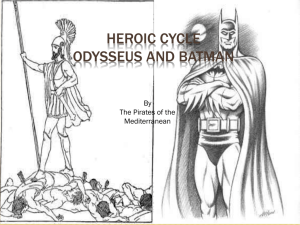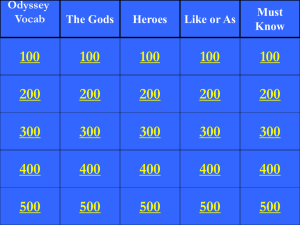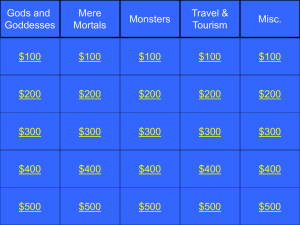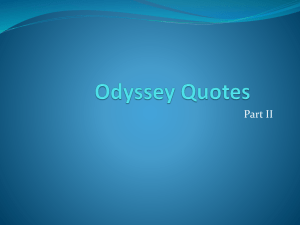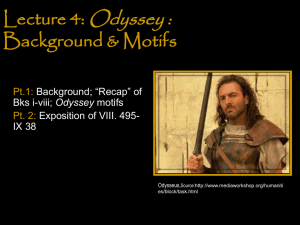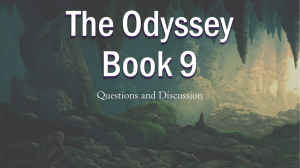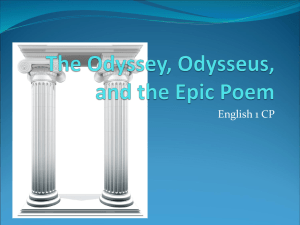I`m feelin book 22 - Ms
advertisement
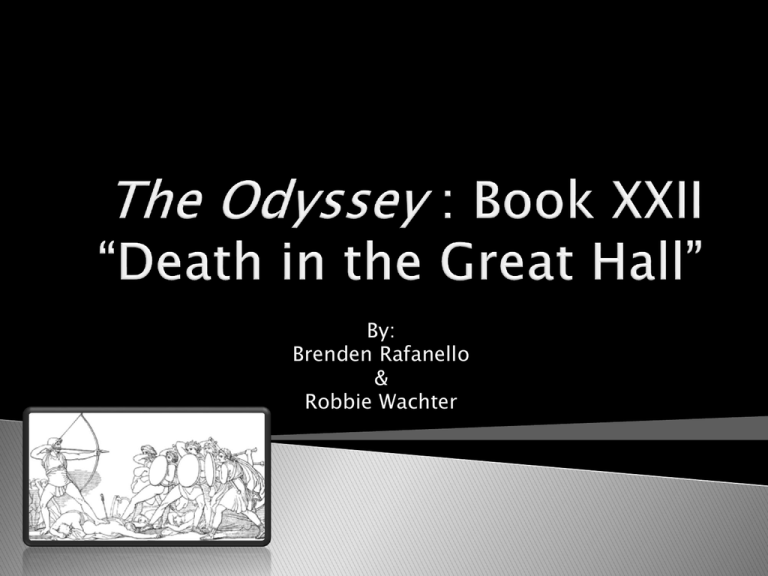
By: Brenden Rafanello & Robbie Wachter Setting: The Setting of this book takes place in Odysseus’s manor in Ithaca. Main Idea: The main idea of book XXII includes the universal idea of the epic poem, The Odyssey, good vs. evil. Odysseus returns to his manor at home in Ithaca and spares none of the suitors who were in pursuit of his wife when he was gone. It is the action-packed climax of The Odyssey where Odysseus completes his journey home. Character Actions in Book XXII Odysseus Reveals himself before the suitors; takes down the suitors one by one with aid from others Telemachus Helps Odysseus fight off the suitors; retrieves four sets of spears and armor for the men; forgets to lock the storeroom Athena Arrives late to the quarrel disguised as Mentor; protects Odysseus and Telemachus during the fight Melanthius Goes into the unlocked store room to retrieve more spears and armor for the suitors; caught in the act by Philoetius and Eumaeus; tortured and killed Philoetius Helps Odysseus fight off the suitors; in charge of guarding the exits of the manor with Eumaeus Eumaeus Helps Odysseus fight off the suitors; in charge of guarding the exits of the manor with Philoetius Eurycleia Ordered to tell the disloyal servant women to clean the bloody bodies in the hall after the fight Suitors Fight against Odysseus, Telemachus, Eumaeus, and Philoetius; helpless against the likes of Odysseus in battle Servant Women Clean the great hall after the fight; executed by Odysseus for being disloyal while he was gone Book XXII starts with Odysseus catching the suitors off guard. He takes hold of his bow and shoots an arrow through the throat of Antinous. The suitors now recognize the man standing before them. After almost 20 years, Odysseus has returned to his estate in Ithaca and has come to seek revenge on the suitors who tried to woo his wife Penelope. Philoetius and Eumaeus, Odysseus’s cowherd and swineherd before he left to tend to the Trojan War, help defend against the suitors as they stand guard at the exits to the manor. Eurymachus tries to convince Odysseus that Antinous was the only evil suitor, and that the other suitors were put up to his bad deeds; Odysseus disregards this as he states that none of them will be spared. Telemachus goes to retrieve spears and armor for his men in the storeroom, but forgets to lock it behind him; Melanthius makes his way into the storeroom to help equip the suitors with armor and weapons. Philoetius and Eumaeus find Melanthius in the storeroom and they’re ordered to tie him up in there until after the battle. Athena shows up to the battle disguised as Mentor, but doesn’t help Odysseus fight against the suitors right away; she tests his strength against them. Although she doesn’t take part in the fighting, Odysseus and his men do benefit from the protection they get from Athena as she directs the suitor’s spears off-target. Volleys of spears are exchanged at each side; Odysseus and his men survive on some minor wounds and the suitors face several fatalities. As the last suitor is killed, Odysseus spares Phemius and Medon, two of his most loyal men; Leodes, pleading for life, was decapitated by Odysseus and was one of the last men to die in Odysseus’s homecoming rampage. Telemachus convinced Odysseus to spare the lives of Phemios and Medon. Phemios was spared because he was forced against his will by the suitors to sing for them, and Medon was spared because he helped care for Telemachus when he was a child. Eurycleia is set to retrieve the disloyal servant women accused of having affairs with the suitors. After they clean the hall of the bloody bodies, they themselves are executed by Odysseus by method of hanging. Odysseus tortures Melanthius, and then kills him after he endures much pain. Odysseus orders Eurycleia to purify the smell of blood in the manor with a fire; Odysseus also prepares to reveal himself before his beloved wife Penelope. Two major themes are portrayed in this part of the novel. The first theme is of Good vs. Evil. In book XXII, the ultimate battle between good vs. evil occurs. This battle is between Odysseus (with the help of Telemachus and some loyal servants) and the suitors. In Hugh Lloyd-Jones’s critique, “The Odyssey as Moral Fable,” he discusses how Zeus doesn’t make people become evil and that Zeus tries to caution people about evil ideas that they think of. This is evident when he sends a pair of Eagles to warn the suitors about bad things to come in Book II. Furthermore, the critique states Zeus argument that “they (mortals) themselves through their wicked recklessness have to endure pains beyond what is fated.” In this book we see how the suitors must face this pain that they basically brought on themselves through their own selfish and evil ways. Odysseus is the hero that brings this justice to his home and delivers the suitors their deserved fate. En medias res: pg. 409 lines 1-16 Personification: pg. 409 lines 15-16 Heroic simile: pgs. 418-419 lines 333-346 The theme of identity is evident when Odysseus kills Antinous in the beginning of Book XXII. The suitors don’t believe it is really Odysseus who has returned because it has been almost twenty years and it is hard to recognize him. Furthermore, Odysseus is slow to reveal himself to his wife Penelope after the battle. On top of that, Athena is disguised as Mentor during the great battle. She hides her identity so that the suitors don’t realize she is a goddess, which allows her to protect Odysseus and Telemachus during their battle without being noticed. In the literary critique, “Bloom on The Odyssey”, written by Harold Bloom, the theme of identity is apparent as an important theme portrayed within the epic poem. Bloom writes “Despite the wisdom of Odysseus, his identity is not easily maintained, since his great enemy is the ultimate shape shifter, the god of all ocean. Athena, the hero’s champion and guide, is well aware of the odds against Odysseus, and the hero himself knows how much he needs her assistance if he is to survive.” The odds were certainly against Odysseus in this chapter as he was clearly outnumbered by the suitors, but like a true hero he prevails thanks to some supernatural assistance. These two ideas about identity are portrayed in the course of book XXII. Odysseus shows himself to the suitors as the master of battle, and the champion of war. Athena is portrayed as Odysseus’s guide and protector during this book when she protects him and his men in the fight against the suitors. Identity example: pg. 413 lines 124-125 Epithet: pg. 413 lines126-134 Heroic simile: pg. 421 lines 434-438


